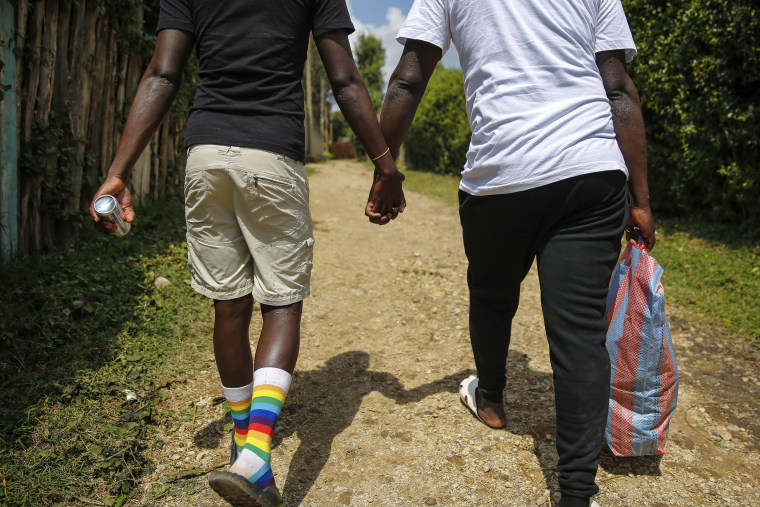In condemning a law the Uganda Parliament just passed that imposes life imprisonment for gay sex, the death penalty for “aggravated homosexuality” and makes it a crime to even identify as LGBTQ, the White House this week called the measure from the East African nation “one of the most extreme” anti-LGBTQ laws in the world and said that “no one should be attacked, imprisoned or killed simply because of who they are or who they love.” Uganda President Yoweri Mouseveni is expected to sign the bill into law. White House National Security Council spokesman John Kirby said Wednesday “there might be repercussions that we would have to take.”
President Joe Biden has passed up previous opportunities to penalize Uganda for other alleged human rights offenses.
But President Joe Biden has passed up previous opportunities to penalize Uganda for other alleged human rights offenses. Last year, Sen. Bob Menendez, D-N.J., chair of the Senate Foreign Relations Committee, formally requested that Biden revoke an invitation he’d sent Mouseveni for last year’s U.S.—Africa Leader’s Summit. Not only did Mouseveni attend, but he was also gifted a meeting with U.S. Ambassador to the United Nations Linda Thomas-Greenfield, who says she met with Mouseveni to “reiterate the importance of democratic institutions.”
The relationship between the United States and Uganda is complicated by the political power that American evangelicals have exerted there. Yes, the same political movement that once campaigned against gay marriage protections and is now campaigning against drag queen story time has now spent millions of dollars over the past decades pushing an anti-LGBTQ agenda throughout African countries — and in Uganda in particular.
American evangelical missionaries arrived in Uganda in the 1980s. They built medical clinics and schools as part of a strategic effort to prompt a religious revival in the developing world. The 1980s also marked the start of the AIDS epidemic that, at its peak, ended up infecting 30% of pregnant women in Uganda and 20% of adults across the continent. That epidemic also orphaned 34 million children across the continent. Missionaries in Uganda quickly adopted America’s virulent homophobia to preach against what they argued was deviant sexual behavior.
It did not matter that AIDS in Africa was mostly spread by straight people. Lou Engle, an evangelical leader from Kansas City, Mo., known for his opposition to abortion and gay people, brought Ugandan preachers to America for training and education. In turn, these preachers, such as Martin Ssempa, became driving forces behind ongoing efforts to criminalize and stigmatize LGBTQ Ugandans. Ssempa became the global face of Uganda’s anti-gay movement, known for incendiary sermons and rallies focused on demonizing gay people.
American church leaders have also had a direct hand in Uganda’s criminalization of LGBTQ people.
Widespread evangelical influence made Uganda a test case for a broader social agenda. According to a publication from The Borgen Project, which advocates for the eradication of global poverty, by 2014 evangelical nongovernmental organizations accounted for 20% of all nonprofit groups in Uganda and held $2 billion in wealth. That’s a lot of power in a country where nearly 25% of people live on $1.20 a day. Similar to the tax-free status of their churches in the United States, the American evangelical offshoots in Uganda receive special government considerations and priority grant status. Meanwhile, secular NGOs that receive government funding are prohibited by Ugandan law from engaging in any advocacy or political activity.
American church leaders have also had a direct hand in Uganda’s criminalization of LGBTQ people. The PBS documentary “God Loves Uganda” features Scott Lively, a religious personality who blames homosexuals for the Holocaust, and follows his celebrity rise in East Africa. In that documentary, we see Lively appearing on talk shows and addressing the Ugandan Parliament in favor of the 2009 version of the Anti-Homosexuality Bill.
For the United States, it is not an easy answer to sanction or eliminate humanitarian aid to countries with laws that violate human rights, including criminalizing homosexuality and punishing LGBTQ people with prison sentences or death.
The United States’ longstanding alliance with Saudi Arabia is a clear example of the contradictions inherent in U.S. foreign and domestic policy. Complicating matters is the increasing anti-LGBTQ sentiment shown by state legislatures across this country. It’s hard for the United States to speak about the awfulness of foreign legislation that criminalizes LGTBQ identity when states here are passing “Don’t Say Gay” laws. But Uganda is an even trickier situation for Biden, who is about to face a tough re-election against a party that gets half its primary votes from white evangelicals.
The United States’ longstanding alliance with Saudi Arabia is a clear example of the contradictions inherent in U.S. foreign and domestic policy.
It’s not that Biden has ever counted on white evangelicals for his support, but by speaking out now against what the American evangelical movement considers one of its major accomplishments, Biden would essentially unify evangelical voters at a moment when they’re split among which Republican candidate to choose. But Biden needs to take action, despite the certainty that evangelicals will use whatever he does against him.
As Menendez made clear in his letter from last year, the United States does have influence it could exert. “President Museveni cares deeply about his reputation and his standing with the United States,” Menendez wrote. “U.S. actions can have an impact.” It shouldn’t even require political courage to use American foreign power to defend internationally recognized human rights and to stop new efforts to imprison or execute people for being themselves, especially not by a president who continually defends the LGBT community at home.
